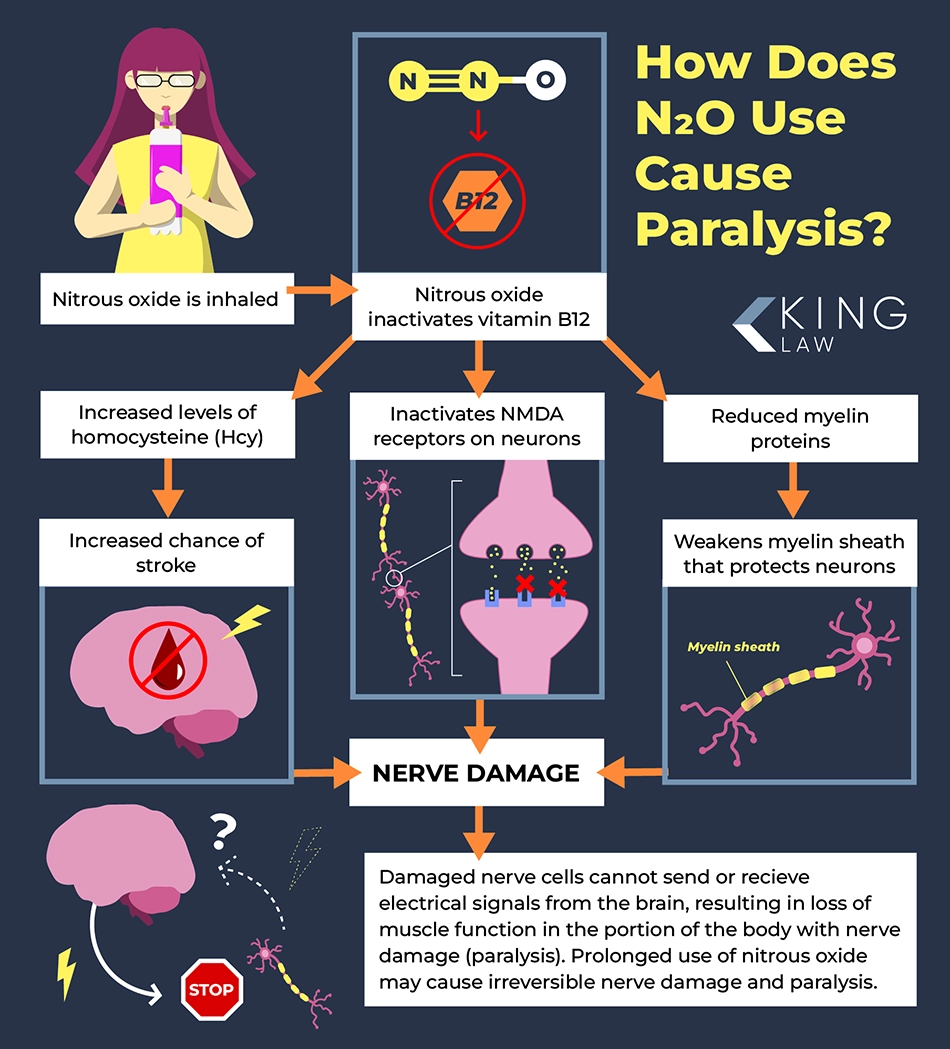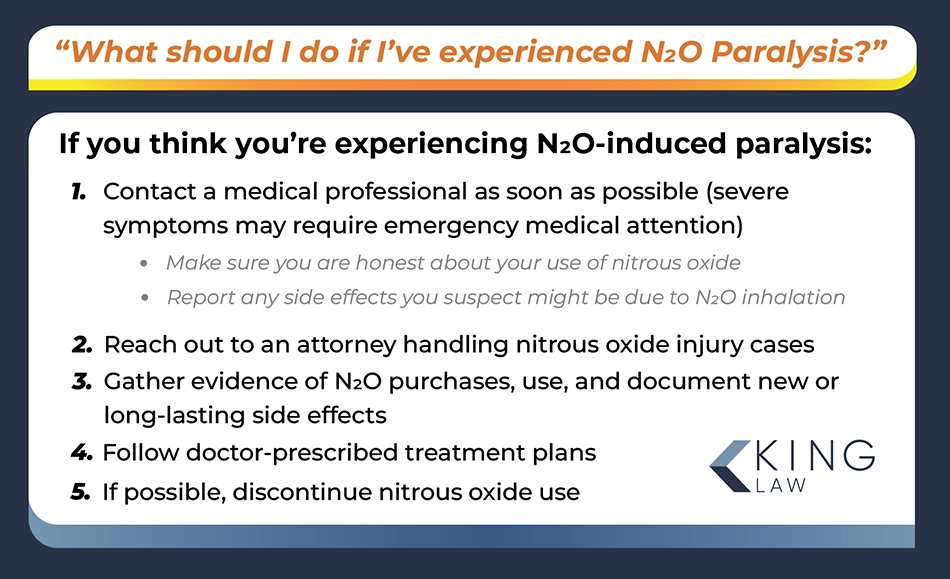Complete the form below to see if you qualify for a Whip-It Lawsuit

Nitrous oxide is popular across the United States as a party drug. However, some regular users are experiencing a dangerous side effect: paralysis. People who use N2O regularly or become addicted have an even higher risk of nerve damage.
Medical professionals are reporting a concerning rise in paralysis and other neurological injuries because young people are inhaling nitrous oxide. Nitrous oxide-induced paralysis may be reversed if the person seeks treatment right away, but many people experience long-term disabilities even after treatment.
This article shares information about nitrous oxide-induced paralysis, including how it can happen, how it is treated, and how long it lasts. The article also explores the scientific evidence connecting nitrous oxide and paralysis and provides legal steps someone can take if they suffer from this debilitating side effect.
About Nitrous Oxide-Induced Paralysis:
What Is Nitrous Oxide-Induced Paralysis?
How Does Nitrous Oxide Cause Paralysis?
Nitrous Oxide Poisoning and Paralysis Symptoms
How Long Does Paralysis From Nitrous Oxide Last?
Can Nitrous Oxide-Induced Paralysis Become Permanent?
Studies Linking Nitrous Oxide to Paralysis
Nitrous Oxide Paralysis Treatment and Recovery
Have You Experienced Nitrous Oxide-Induced Paralysis?
What Is Nitrous Oxide-Induced Paralysis?
One of the alarming side effects of nitrous oxide (N2O) is paralysis. When someone has paralysis, they lose motor function in one or more muscles. They may also have sensory loss or permanent sensory damage. Recreational nitrous oxide use is one of the known causes of paralysis.
Paralysis induced by nitrous oxide happens when someone experiences nerve damage from a lack of vitamin B-12 or other factors. Many people who inhale the gas for fun are not aware of this dangerous side effect.
N2O can cause paralysis in people because it changes how parts of the body work, such as the spinal cord and nerves. Nitrous oxide can also cause the spinal cord and nerves to break down because they do not have the enzymes and other chemicals they need to function properly. Historically, nitrous oxide-induced paralysis was thought to be rare; however, as N2O abuse rates have gone up, so have the rates of nitrous oxide-induced paralysis.
How Does Nitrous Oxide Cause Paralysis?
Nitrous oxide can cause paralysis for a couple of different reasons. One reason is that it changes how vitamin B-12 works in the body. Nerves and neurons need vitamin B-12 to complete important processes and make myelin. Myelin protects nerves. For comparison, myelin is like the rubber tube that electrical wires go into. It is a coating that goes around nerves, the spinal cord, and neurons to protect them. Without myelin, the nerves and neurons do not work well, and they can start to break down. Once nerve damage is set in motion, these processes are not always reversible, especially if the damage is severe or spreads.
Not everyone who experiences paralysis because of whippets will have a B-12 deficiency (shortage). Instead, they may have too much or too little of other chemicals the body processes (like homocysteine) by using B-12. Nitrous oxide also stops NMDA receptors (a kind of neural receptor) from working, which are channels that use a chemical called glutamate to help your neurons talk to each other. Without glutamate, your brain may not be able to tell your body what to do.

Nitrous Oxide Poisoning and Paralysis Symptoms
The paralysis caused by nitrous oxide can come on suddenly or gradually. Here are some of the concerning signs of nitrous oxide poisoning to look out for:
- Numbness
- Tingling
- Pins and needles feeling
- Weakness
- Difficulty controlling your muscles
- Not being able to feel or move parts of your body
- Struggling to maintain your balance
- Seizures
- Bladder or bowel problems
- Reflexes that are dulled or hyperactive (no response or a heightened response)
If the person already has a vitamin B-12 deficiency or has pre-existing health conditions, they may be more likely to experience severe side effects of nitrous oxide. These injuries include paralysis, nerve damage, psychosis, and spinal cord injuries.
How Long Does Paralysis From Nitrous Oxide Last?
There is no way to predict how long paralysis from nitrous oxide will last. However, if you frequently use nitrous oxide or use it in large quantities, it may be more difficult to recover from paralysis. In some situations, the paralysis and other neurological symptoms caused by nitrous oxide can be reversed if the person is treated early on.
For example, one teenager experienced paralysis and loss of muscle coordination after using nitrous oxide for 10 months. She received vitamin B-12 and cyanocobalamin treatments, as well as other therapies for about 6 months. Her symptoms greatly improved; however, she still had weakness and dulled reflexes and may not fully recover.
People who use high doses of nitrous oxide or use it for months or years may never fully recover. For example, a 26-year-old woman in the UK used nitrous oxide daily from the age of 18 to 23. She woke up with a loss of feeling in her hands and feet and went to the emergency room. She was told she had permanent paralysis, and she has not regained the ability to use her legs or arms ever since, despite treatments.
Can Nitrous Oxide-Induced Paralysis Become Permanent?
Yes. The paralysis caused by nitrous oxide misuse can become permanent. Even those who do recover may struggle with lack of sensitivity, numbness, tingling, and body movement months or years after being treated with B-12 and other therapies.
If you have any symptoms of nerve damage or paralysis from nitrous oxide, you should stop inhaling the drug. Getting treatment and stopping all nitrous oxide use provides the best chances of regaining at least some of the feeling and function in your body. Seeing a doctor and telling them about your N2O use gives them the information they need to help you.
Nitrous oxide will not show up in blood or urine tests, so your doctors may not know you used N2O unless you tell them. If they do not have this knowledge, they may not give you the medications or treatments you need to prevent the paralysis from becoming permanent.
Studies Linking Nitrous Oxide to Paralysis
Nitrous oxide can be extremely harmful to your brain, neurons, nerves, and spinal cord. Dozens of case reports have confirmed that nitrous oxide can have serious neurological effects, including paralysis. Here are some of those studies.
Case Series About N2O and Spinal Cord Damage
In A rise in cases of nitrous oxide abuse: neurological complications and biological findings, researchers looked at patients who had a spinal cord injury because of nitrous oxide use. All five of the patients were young adults (19 to 29 years old) who inhaled nitrous oxide daily. None of them had decreased B12 levels. However, the doctors noted that they each had high levels of “homocysteine and methylmalonic acid,” which your body needs vitamin B12 to break down. The patients received vitamin B-12 infusions, and they all experienced some level of relief from their neurological symptoms.
Case Report About Leg Paralysis from N2O Use
In another case report, an Australian woman could not move her legs after she used nitrous oxide extensively after spraining her ankle 10 days prior. She had used 10–20 whipped-cream bulbs per day before she lost mobility. The woman was 20 years old and, while she had a history of drug abuse prior to this event, nitrous oxide was the primary cause of her paralysis. She received vitamin B-12 injections and fluids to help her recover from the nerve damage and severe dehydration she was experiencing. After she received at least seven months of intensive treatments, she regained feeling in her body; however, she still needed a walker to move around, and she could only walk short distances.
Case Study About Nitrous Oxide and Neuropathy
Another 20-year-old woman developed neurological and sensory issues after using nitrous oxide for about two months. She experienced peripheral neuropathy, which is when the nerves outside of the brain and spinal cord are damaged. She suffered from weakness, numbness, tingling, and the inability to move her arms and legs. Her symptoms matched up with Guillain-Barré Syndrome; however, she told her doctors about her nitrous oxide misuse, so they were able to properly identify and treat this as the reason for her paralysis.
The doctors gave her vitamin B-12 and antibody treatments and steroids, and the woman regained the ability to walk several months later. The researchers stressed that many N2O victims are misdiagnosed as having another disorder (like Guillain-Barré) because their doctors do not know that they have been taking nitrous oxide for fun. If the doctors have this information, they can make the correct diagnosis and recommend proper treatments.
Nitrous Oxide Paralysis Treatment and Recovery
People who experience partial paralysis or neurological symptoms from nitrous oxide use should immediately visit a doctor to begin treatment. Early treatments and intervention can give someone the best chances of recovery.
If you are experiencing paralysis, lack of coordination, or a change in muscle strength, you should visit a medical practitioner as soon as possible. When you visit, it is crucial for you to be honest with your medical providers about your nitrous oxide use. You should also share all of the side effects you are experiencing after N2O use. Then, the doctors will be able to create an appropriate plan of action if they know nitrous oxide is the likely cause of your symptoms.
If you are experiencing neurological symptoms or paralysis, you may receive vitamin B-12 injections for several weeks. Afterward, you may still need to take extra vitamin B-12 to ensure your body has what it needs to recover. During and after treatment, you should not use any forms or doses of nitrous oxide, because a relapse can stop the vitamin B-12 treatments from working.
Sometimes, doctors may also have their patients take steroids or special infusions. You may also need occupational or physical therapy to help you regain muscle control and strength throughout your body.

Have You Experienced Nitrous Oxide-Induced Paralysis?
If you suffered from paralysis after huffing nitrous, it is important to protect your physical health and your legal rights. See a doctor right away so they can connect you with the treatments you need to decrease the likelihood of your paralysis spreading or becoming permanent. You may also want to contact a personal injury lawyer who can tell you if you have a legal claim against the business that sold or manufactured the nitrous oxide that harmed you. Filing a lawsuit can help with the costs of medical treatment, therapy, rehabilitation, lost wages, and other costs.
Contact a Nitrous Oxide Lawyer Today
If you or your loved one experienced paralysis caused by nitrous oxide, you may be entitled to legal compensation. Our law firm has helped thousands of people stand up against companies that created dangerous products and did not properly warn people about the risks. We welcome the opportunity to fight for you, too, so you can begin to rebuild and move forward.
Get in touch with our team today by calling (585) 496-2648. We provide free consultations, and we have the technical and legal experience required to help nitrous oxide victims bring strong lawsuits against N2O companies. You only owe us money if we secure compensation for you.

